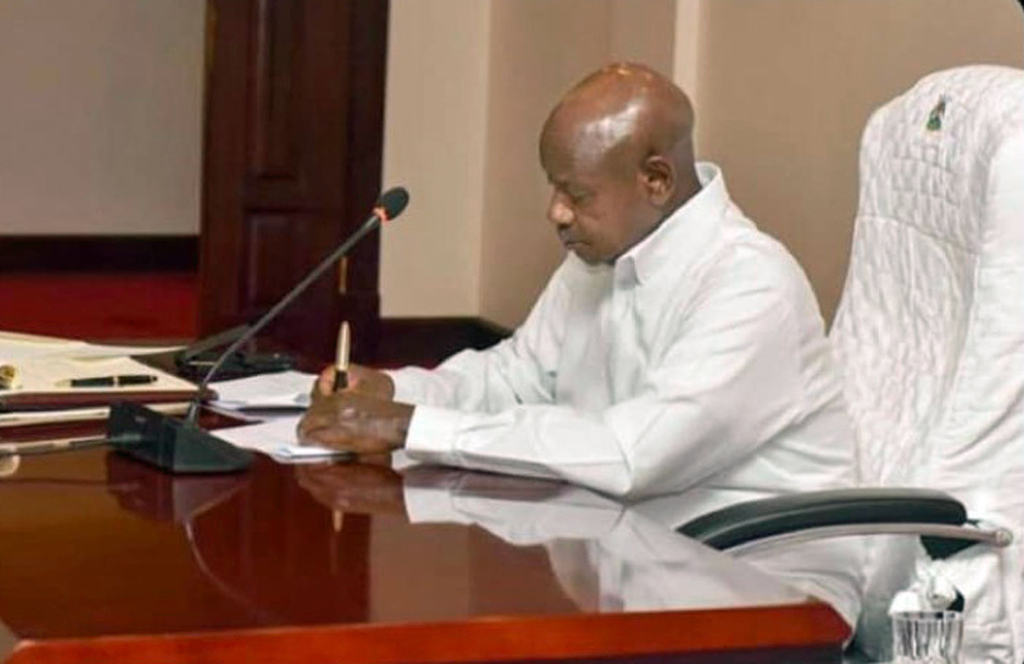
Uganda President Yoweri Museveni signs the Anti-Homosexuality Act of 2023. (Photo courtesy of State House Uganda)
By Joto La Jiwe
A new report by the Human Rights Awareness and Promotion Forum (HRAPF), has revealed a rapid increase in cases of violence and human rights violations based on real or presumed sexual orientation or gender identity in the wake of the Uganda’s Anti-Homosexuality Act 2023 (AHA), which became law in May.
The report by the Uganda-based NGO documents different cases of violations and violence against LGBTQ persons that were handled by the Legal Aid Clinic at HRAPF during the August 2023, the third full month of the AHA being in force. According to the report, both the state and the citizens zealously enforced the AHA in their different capacities, with arrests of real or suspected LGBTQ persons continuing, as well as cases of violence and evictions from rented accommodation.
Details from the cases reported too HRAPF since the act came into force are shocking. Many cases involve evictions, as the AHA effectively makes it illegal to rent property to or house LGBT people. Multiple cases document landlords and family members evicting people simply on the basis of rumor that they may be queer. In one documented case, a woman was evicted after she told a man who had been harassing her that she was not interested in him and he reported her as a lesbian to the landlord. Another man was exiled from his village by the local council, who warned him he would face violence if he stayed. In several cases, clients said their landlords explicitly told them they were being evicted in order to comply with the AHA.
The report also documents cases of extreme violence, extortion, and sexual harassment, and several arrests on the basis of real or perceived sexual orientation and gender identity.
HRAPF has previously documented violence and violations of the rights of LGBTQ persons during the run up to the passing of the AHA, and since it became law. This new report also documents the total number of cases since the AHA came into force, and showing a shocking trend of increasing violations against LGBTQ persons over the past five years.
Out of a total of 220 cases (involving LGBTQ persons) handled across the HRAPF legal aid network in the first three months of the AHA 2023, the report reveals that 146 (66.4%) targeted LGBTIQ people on the basis of their sexuality, affecting a total of 176 persons. That three-month total of 146 would correspond to an annual rate of 584 violations on the basis of sexuality.
In contrast, in 2021, HRAPF reported a total of 253 violations of human rights based on sexual orientation and or gender identity or expression by both state and non state actors , down from 398 in 2020 and 282 in 2019.
The latest report categorizes the cases in form of evictions, violence and arrests. The month July was the worst month accounting for the highest overall number of violations as shown in the tables below:
THE BREAKDOWN OF CASES — SUMMER 2023
| Nature of Violation | June 2023 | July 2023 | August 2023 | Total Number of cases |
| Evictions | 19 | 26 | 22 | 67 |
| Violence | 23 | 21 | 19 | 63 |
| Arrests | 4 | 6 | 6 | 16 |
| Total | 46 | 53 | 47 | 146 |
NUMBER OF VICTIMS AFFECTED — SUMMER 2023
| Nature of Violation | June 2023 | July 2023 | August 2023 | Total Number of Victims |
| Evictions | 20 | 33 | 26 | 79 |
| Violence | 23 | 24 | 22 | 69 |
| Arrests | 7 | 10 | 11 | 28 |
| Total | 50 | 67 | 59 | 176 |
HRAPF reports that the number of cases has increased greatly since 2022.
In August 2022 for example, only 13 cases involved actions that directly targeted LGBTQI persons on the basis of their real or presumed SOGIE (9 cases of violence, 3 evictions and 1 arrest) compared to 47 in August 2023 (22 evictions, 19 cases of violence and 6 arrests).
Based on the above statistics, the authors of the report conclude that the difference in the figures is attributable to the enactment of the Anti-Homosexuality Act, which both local and international human rights advocates have condemned as a draconian and homophobic.
The curve for homophobic arrests in particular has not dropped in the three months after AHA 2023;, which the report suggests is a clear indication that its enforcement is going strong, as is its impact on the lives of LGBTQ persons in Uganda.
Joto La Jiwe, the author of this article, is a Ugandan correspondent for the African Human Rights Media Network. He writes under a pseudonym. Contact him at [email protected].
COMMENTS